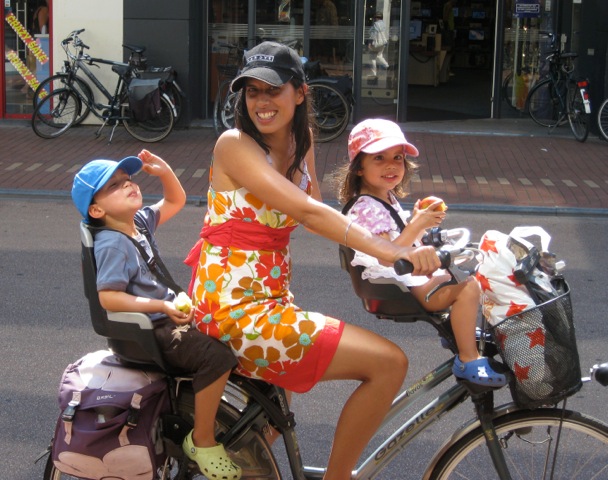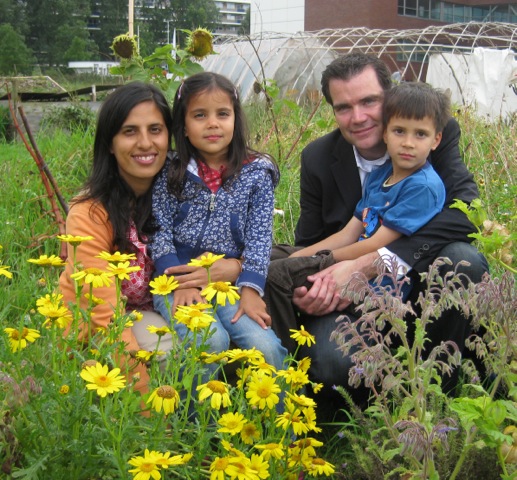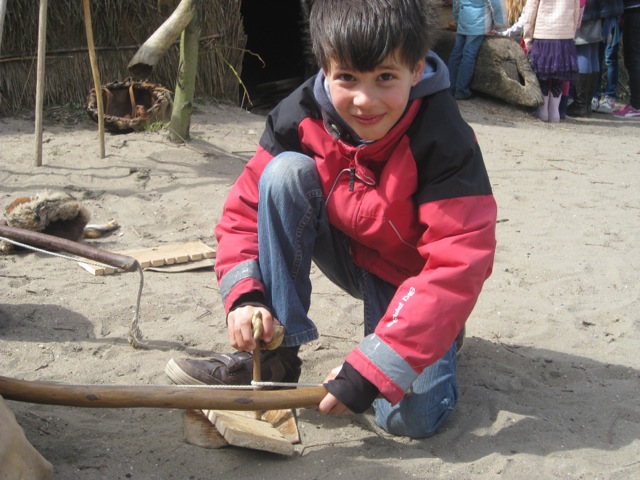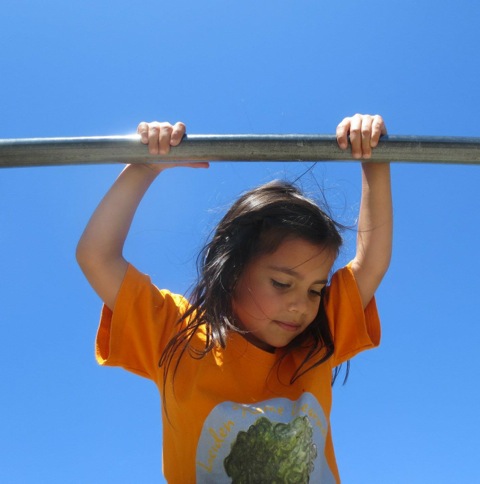
Rippy Dusseldorp Saran lives in the Netherlands, in Leiden, with her husband, Graham, and their son Gianluca (born in 2004) and daughter Gisele (2006). Their family started unschooling in 2008 and their children have always been unschooled. In 2010, they started Leiden Home Learners, an unschooling-friendly homeschool group. Now there are several ‘Home Learners’ groups around the Netherlands initiated by different homeschooling parents.

Rippy: Yes, we are quite the international family. Graham and I met on an airport shuttle bus in Perth in 1999. Both of us had Australian working holiday visas and for both of us it was our second trip to that beautiful country. We discovered we had a lot in common—we both loved to travel and learn about other cultures, people, languages, traditions, we both had not yet visited South America or Antartica, but had traveled to the other continents, we had studied similar things at university, we cared about similar social issues, and we were both thinking of working for the United Nations. I was looking into a UN position in Ghana and Graham was looking into a post-doctorate program in Japan. But then we fell in love and decided we wanted to be together as much as possible. It was a bit tricky in the beginning, but we've only been apart for a handful of weeks in all these years. He's my best friend. We decided to give up on some of our dreams, but only because we came up with newer, better dreams together.
We have two fun and funny children—Gianluca (8 years old) and Gisele (6 years old). I decided to stop working once Gianluca was born and I spend my days with the children playing, learning, having adventures and discovering the world. Graham works as a Senior Policy Advisor and Peer Coach at the Ministry of Economic Affairs and coaches with our company, Maple Tree.

Rippy: I think homeschooling in Canada would be easier. Most people have heard about it and there is a much larger homeschooling population in the country. Things would have probably have been easier.
But unschooling in the Netherlands has been great for our family. We have official exemption from the school obligation law. All children in the Netherlands are required to attend school. Basically, the only way you can get exemption is if your children have never been to school and if all the schools within a reasonable distance do not fit your life philosophy. Our city government granted our exemption without any issues, but some of our friends have not been so fortunate. Homeschooling is very rare in the Netherlands. I believe the last official numbers showed that there were 328 children out of a school [going] age population of over 2 million children.
The Netherlands has really interesting children's activities, programs and places for Dutch children to visit. It's nice to visit these places on days when they are not busy. The country is really small with great public transport and we spend a lot of our time exploring new places and visiting old favourites. Graham changed his work contract to have Fridays off and we often go on family trips on this day.
One thing we noticed in our first year of homeschooling was that the children didn't have enough friends to play with during school hours. We started Leiden Home Learners, a weekly home learning group, so the children would have the chance to meet other homeschooling children regularly. Now they know several children and often have dates around the country to visit them in their homes, at the beach or somewhere else fun and fabulous for children to hang out and play. We try to stay in Leiden on Wednesdays (when elementary children are free in the afternoons) and on weekends because on these days they can play with friends in the neighbourhood who usually go to school.
The homeschooling community has changed quite a bit in the last 3.5 years since we started. There were fewer meetups before, but now sometimes there are three different options to meet within the same day. It's wonderful to have so many options!
If the homeschooling law changes here and makes unschooling too difficult, I imagine we'll move to Canada so we can unschool the children in peace. We would still visit the Netherlands frequently for holidays.

Sandra:
The conferences you organized in June 2012 and 2013 were fun for me as a speaker, and seemed to be enjoyed by your attendees.
Sandra:
It sounds so exotic, all those foreign countries, but in North American terms, it's halfway across the continent. We could still be in the same country.
Sandra:
I've been using some photos from that trip on "Just Add Light and Stir," so I know there was a family there from Northern Ireland and one from England, and your family—in a rented house for several days. That sounded really fun, and I liked knowing that Tesco (a grocery store) gives points people can use to rent cottages.
I imagine your Canadian and Indian connections are big advantages, for unschooling.
When we go to Canada, we also visit for several weeks and they are able to really get a feeling of what it is like to grow up in Canada. Last time we visited we were there for three months. We played in the snow, experienced freezing cold temperatures, attended winter festivals, toboganned on a frozen lake under the stars, took part in a pow wow dance and listened to Aboriginal music in a tipi. They went hiking in the Rocky mountains and went to their aunt's wedding in Vancouver. They love Canada and it's so nice that we're not restricted by school holidays.

Rippy: I was responding to something Pam Sorooshian wrote on the list about not knowing of anywhere else outside of a therapeutic relationship where you can get the kind of direct, critical, and honest feedback that Always Learning gives.
I grew up going to ‘sangat’ —small fellowships in the Sikh faith where, in part, people learn about living with kindness and integrity. Sikhism believes that we are all on a path to reunite with the source (God) and for this to happen, you need to become kinder and more compassionate. "Direct, critical, and honest feedback" was highly valued and appreciated. My family used to regularly travel to India to a Sikh ashram where we were encouraged to examine our thoughts and words. The philosophy there was that helping one another grow into more loving, mindful people is one of the greatest acts of service one can do. Some of the most valuable skills that I learned in life and use every day were learned in the fellowship and ashram. I was frequently reminded that 'thoughts become words, words become actions, actions become habits, habits become your character and your character becomes your destiny'. For me, Always Learning feels like my fellowship.

Rippy Dusseldorp, on how she has decided what to do in different times in her life (box on the right side, partway down)
Responding to questions about unschooling
Local Groups —the benefits of a local playgroup and support group, and how Rippy organized hers

